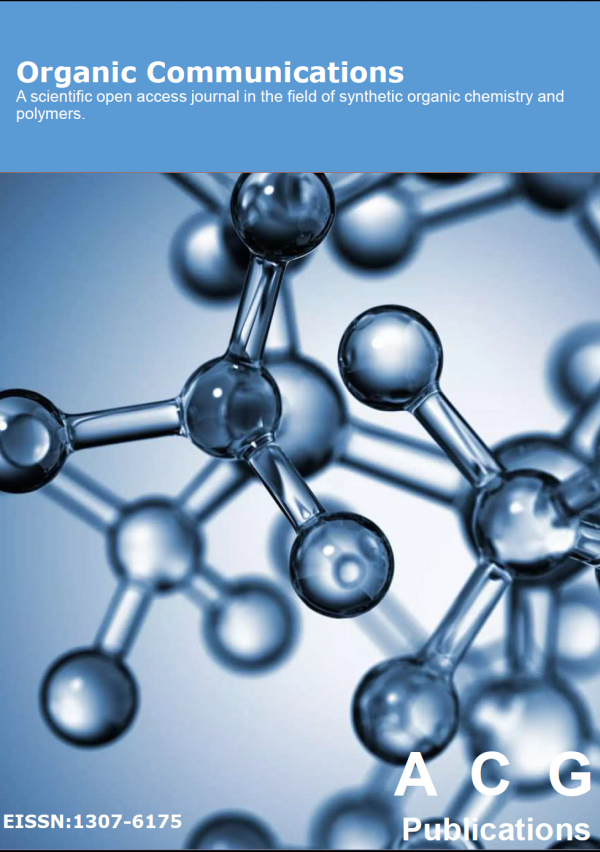Organic Communications
Year: 2016 Volume: 9 Issue:4 October-December
1) Microwave assisted synthesis of 2′-/3′-azaflavones/azaflavonones and their N-alkyl derivatives
2′-Azaflavonone (6) and 3′-azaflavonone (7); were synthesized by a simple environmentally friendly microwave-assisted one-pot method for the cyclization of 2′-hydroxy β′-2-azachalcanon-β-ol (1), 2′-hydroxy (E)-2-azachalcone (2), 2′-hydroxy (E)-3-azachalcone (3) under solventless conditions using K-10 clay. In addition to these synthesis, 3-(pyridin-2-yl methyl)-2′-azaflavone (8) and 3-(pyridin-3-yl methyl)-3′-azaflavone (9) were synthesized using silica-supported sodium hydrogen sulphate then the treatment with base, respectively. Additionally, for antimicrobial activities N-alkyl substituted 3′-azaflavonium and 2′-azaflavonium bromides (10-12) were prepared from compounds 3, 4 - 5 and 8 - 9.
Keywords Azaflavone azaflavonone microwave azachalcone DETAILS PDF OF ARTICLE © 2016 ACG Publications. All rights reserved.2) Reinvestigation of bromination of 8-substituted quinolines and synthesis of novel phthalonitriles
Bromination of a series of 8-substituted quinolines was reinvestigated and specified for optimum yields and isolation conditions. Mono bromination of 8-hydroxyquinoline ( 2a ) and 8-aminoquinoline ( 2c ) gave mixture of mono and dibromo derivatives 5,7-dibromo-8-hydroxyquinoline ( 3a ),5,7-dibromo-8-aminoquinoline (3c), 7-bromo-8-hydroxyquinoline (3d), 5-bromo-8-aminoquinoline (3e)while 8-methoxy quinoline ( 2b ) furnished 5-bromo-8-methoxyquinoline ( 3f) as sole product. N ovel phthalonitrile s, 4-(quinolin-8-yloxy)phthalonitrile ( 6) and 4-chloro-5-(quinolin-8-yloxy)phthalonitrile (8) of 8-hydroxyquinoline ( 2a ) were synthesized and converted into their respective bromo derivatives 4-(5-bromoquinolin-8-yloxy)phthalonitrile ( 7) and4-((5-bromoquinolin-8-yl)oxy)-5-chlorophthalonitrile (9) .
Keywords Bromination hydroxyquinoline phthalonitrile methoxyquinoline aminoquinoline DETAILS PDF OF ARTICLE © 2016 ACG Publications. All rights reserved.3) Synthesis, spectral characterization and biological activity of N-4-(N-2-(trifluoromethylphenyl))sulfamoyl amide derivatives
Synthesis of a series of new N -4-(N-2-(trifluoromethylphenyl))sulfamoyl amide derivatives 6(a-i) was accomplished by a sequence of reactions by using aniline as a starting compound (1). The newly synthesized compounds were characterized by the spectral analysis and evaluated their antibacterial activity. 5-Nitro-N-(4-(N-(2-(trifluoromethyl)phenyl)sulfamoyl)phenyl)furan-2-carboxamide (6b) exhibited the highest activity.
Keywords Aniline trifluoroacetic anhydride sulfonylchloride antibacterial activity DETAILS PDF OF ARTICLE © 2016 ACG Publications. All rights reserved.4) Oxidation reaction of 4-allyl-4-hydroperoxy-2-methoxycyclohexa-2,5-dienone in the presence of potassium permanganate without a co-oxidant
4-Allyl-4-hydroperoxy-2-methoxycyclohexa-2,5-dienone (5) was synthesized by photooxygenation of commercially available Eugenol in the presence of tetraphenylporphyrin (TPP) as a singlet oxygen sensitizer. The brief and one-pot syntheses of some natural product skeletons were conducted using the corresponding allylic hydroperoxide at different temperatures (0 oC and room temperature) with potassium permanganate (KMnO 4) in mild condition at N 2(g) atm.
Keywords Allylic hydroperoxide singlet oxygen photooxygenation eugenol natural product DETAILS PDF OF ARTICLE © 2016 ACG Publications. All rights reserved.5) Spectroscopic and structural study of the newly synthesized pyrrolo[1,2-a]perimidin-10-one derivatives
In this study, pyrrolo[1,2-a]perimidin-10-one compounds were synthesized by the reaction of maleic anhydride with heterocyclic ketene aminals (HKAs) containing perimidine moiety. The structures of these novel compounds were confirmed by IR, 1H NMR, 13C NMR, UV and elemental analysis. In order to develop a more understanding of the energetic and structural properties of pyrrolo[1,2-a]perimidin-10-ones, a series of theoretical calculations were performed. Their geometries have been optimized by using Hartree-Fock and Density Functional Theory. The structures of possible conformations have been examined to predict lower-lying energy structure of the title molecule. Structural parameters and energetics, such as HOMO and LUMO energies, were analyzed comparing the structural isomers.
Keywords Perimidine Pyrrolo[1 2-a]perimidine HF DFT DETAILS PDF OF ARTICLE © 2016 ACG Publications. All rights reserved.6) Synthesis of new potential Indole-3-yl derivatives via Knoevenagel condensation
A variety of 1-acetyl-1H-indol-3-yl derivatives have been prepared from indole-3-carboxaldehyde. By knoevenagel reaction between indole-3-carboxaldehyde and active methylene or non-active methylene compounds yielded the coresponding condensation product, indole-3-yl derivatives (2a-e) and then their N-acetylation with acetyl chloride afforded N-acetyl-1H-indol-3-yl derivatives (3a-e). 1H-NMR, LC-MS, FT-IR and UV-Visible tools were used to confirm the structures.
Keywords Indole-3-carbaxaldehyde 3-substituited indole derivatives knoevenagel reaction acetylation DETAILS PDF OF ARTICLE © 2016 ACG Publications. All rights reserved.7) Potassium carbonate mediated one-pot synthesis and antimicrobial activities of 2-alkoxy-4-(aryl)-5H-indeno[1,2-b]pyridine-3-carbonitriles
2-Alkoxy-4-(aryl)-5H-indeno[1,2-b]pyridine-3-carbonitriles (3a-e and 4a-e) were synthesized via multicomponent reaction from 2-aryl-methylidineindan-1-ones (1a-e), malononitrile and K 2CO 3 in ethanol and/or methanol. The structures of obtained compounds (3a-e and 4a-e) were characterized using the spectroscopic methods (NMR, IR) and elemental analysis. Addition, the in vitro antimicrobial activities of compounds (3a-e) were tested against the five human pathogenic bacteria. Penicillin G and Ceftriaxone antibiotics were used as positive control. The results were given as MIC values (minimum inhibition concentration), and compounds 3b-d showed very high activity against Escherichia coli 111.
Keywords 1-Indanone malononitrile pyridine-3-carbonitrile antimicrobial activity DETAILS PDF OF ARTICLE © 2016 ACG Publications. All rights reserved.